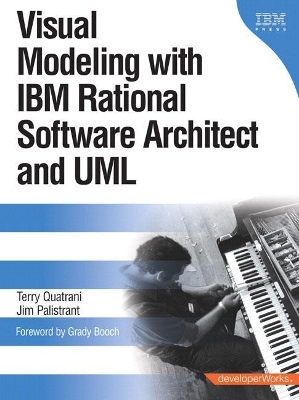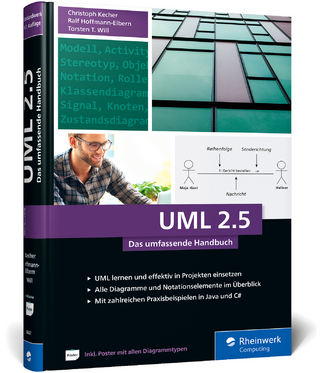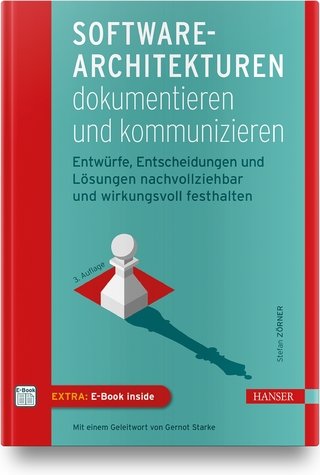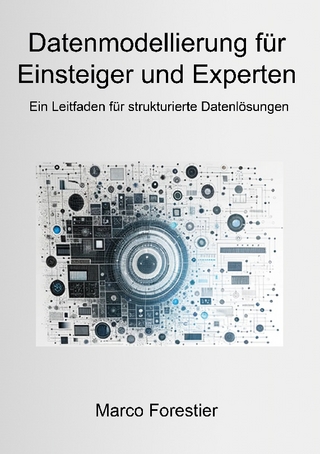
Visual Modeling with IBM Rational Software Architect and UML
IBM Press (Verlag)
978-0-321-23808-5 (ISBN)
- Titel ist leider vergriffen;
keine Neuauflage - Artikel merken
This new edition of the popular book retains the practical approach to teaching visual modeling techniques and the industry standard Unified Modeling Language. Authors Terry Quatrani, the UML Evangelist and Jim Palistrant, the J2EE and SOA Evangelist, both from IBM Rational Software, still use the simplified case study (a course registration system for a fictional university) that has taught thousands of readers how to analyze and design an application using UML, and how to implement the application using Rational Software Architect. After a short history of the evolution of UML and a guide to the basic terms of software engineering, the book walks the user through the different models that are created as an application is developed. Users are given advice as to the layout and contents for a use case model, an analysis model and a design model. In addition, users will see the powerful capabilities included in Rational Software Architect that will help them in their application implementation.
Terry Quatrani, IBM Rational’s UML Evangelist, is responsible for training and transitioning Fortune 500 companies to object technology and for preaching the visual modeling gospel of Grady Booch, Jim Rumbaugh, and Ivar Jacobson. She has spent twenty-one years developing and deploying large software systems. Formerly at GE, she was founding consultant for the Lockheed Martin Advanced Concepts Center. Jim Palistrant, IBM Rational’s J2EE and SOA Evangelist, educates customers and the IBM field force about J2EE and SOA concepts and tools. A frequent speaker at technical conferences worldwide, he has worked with Java, J2EE, and Web technology since 1995.
Foreword xv Preface xvii About the Authors xxiii Chapter 1: Introduction to Visual Modeling 1 The Triangle for Success 4
The Role of Notation 5
History of the UML 5
The Role of Process 8
What Is Iterative and Incremental Development? 8
The Rational Unified Process 9
Rational Software Architect 12
Summary 13
developerWorks Links 14
Chapter 2: Beginning a Project 15 Defining the Right Project 17
Eastern State University (ESU) Background 18
Risks for the Course Registration Problem 19
ESU Course Registration Problem Statement 19
Summary 20
Chapter 3: The Use Case Model 21 System Behavior 23
Actors 27
Use Cases 31
Use Case Diagrams 43
Activity Diagrams 50
Summary 57
developerWorks Links 58
Chapter 4: The Analysis Model 61 Creating an Analysis Model 63
Analysis Model Template 64
Use Case Realizations 66
Documenting Classes 75
Distributing Behavior 80
Sequence Diagrams 81
View of Participating Classes 87
Summary 92
developerWorks Links 93
Chapter 5: The Design Model 95 Design Model 97
Design Elements 101
Identifying Design Elements from Analysis Classes 105
Class Diagrams 109
User Interfaces 120
Summary 125
developerWorks Links 125
Chapter 6: Implementation Model 127 Persistence Choices 129
Service Data Objects 131
User Interface Choices 134
JavaServer Faces 136
Tying It Together 137
Summary 161
developerWorks Links 161
Appendix A: UML Metamodel 163 UML Definition Documents 165
Specification Document Structure 165
Metamodel Structure 166
Appendix B: Notation Summary 169 Index 183
| Erscheint lt. Verlag | 29.6.2006 |
|---|---|
| Reihe/Serie | developerWorks Series | IBM Press |
| Verlagsort | Armonk |
| Sprache | englisch |
| Maße | 177 x 233 mm |
| Gewicht | 440 g |
| Themenwelt | Informatik ► Software Entwicklung ► UML |
| ISBN-10 | 0-321-23808-7 / 0321238087 |
| ISBN-13 | 978-0-321-23808-5 / 9780321238085 |
| Zustand | Neuware |
| Haben Sie eine Frage zum Produkt? |
aus dem Bereich


